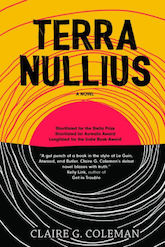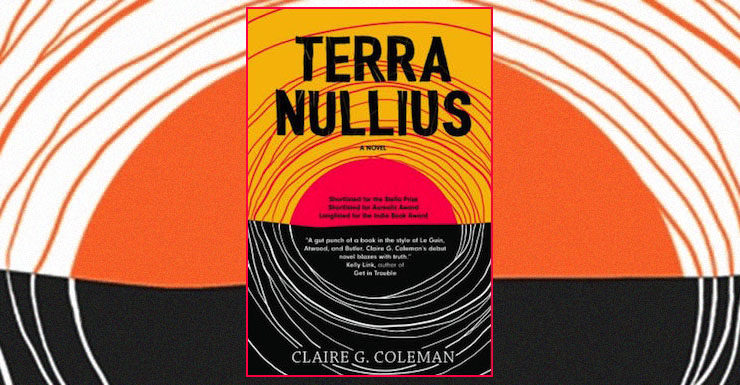Terra nullius is a legal concept, arising from the Roman legal concept of res nullius. Res nullius means “nobody’s thing,” and applied to such things as wild beasts, lost slaves, and abandoned property: things anybody could own by seizing and claiming them. Terra nullius means “nobody’s land,” and seems to have become an established concept in international law by the early 20th century.
But the idea that habitable land is empty and there for the taking goes back a lot further.
Terra Nullius is a tremendously accomplished book. It’s Claire G. Coleman’s first novel, and since its 2017 publication in Australia, it’s been shortlisted for several awards and won at least two. Coleman is an indigenous Australian Noongar woman, and Terra Nullius is a story about settlement, about cultural erasure, genocide, exploitation, suffering. It’s a novel about residential schools who take children from their parents as young as possible and destroy their connections to their culture, training them to be unpaid servants—slaves—and about a colonial administration that sanctions the mass murder of the native population.
It’s gorgeously written and strongly characterised. It’s an admirable work of art, a layered fiction, using your assumptions about the kind of fiction you’re reading against you. It’s a clever book.
And it’s hard, brutally hard, emotionally wrenching. It’s difficult to read. It’s meant to be difficult to read. It shouldn’t be easy. But it’s an exhausting journey towards a bitter catharsis, a journey that lays bare many of the hypocrisies of the alien-invasion and settler-colonial tropes present in science fiction, and much as I admire what Coleman’s doing in Terra Nullius, it’s not a novel I can enjoy. Admire, yes. Appreciate, yes. Enjoy…
…I don’t think Terra Nullius really wants to be enjoyed.
Maybe part of it is where I’m coming from. I’m a white, queer Irish woman. Reading novels that are explicitly about settler colonialism is an uncomfortable experience. Ireland was in many ways the testing ground—the alpha trial, if you like—for several of the tools of settler imperialism that England, later Britain, deployed to devastating effect further abroad. The history of Ireland up to the 20th century is one of dispossession, language loss, cultural erosion, and coercive assimilation to British norms, and that legacy is still very much alive. At the same time, white Irish people benefited (and still benefit) from settler colonialism: when we went abroad, we were and still are part of the institutions that saw nothing wrong with killing people, taking their stuff (and their children), enslaving them, and erasing their culture. Sitting with that discomfort—those simultaneous reminders of one’s own heritage of colonisation and complicity—gives rise to complicated feelings.
Buy the Book


Terra Nullius
Terra Nullius initially gives the impression that it is set in the past, in the history of Australian settler colonisation. It focuses on four main characters: Jacky, a young Native man running away from his enslavement on a Settler farm, trying to find home but with no idea where it is; Esperance, a young woman in a free Native camp on the very edge of survival; Sister Bagra, a Settler nun at a residential school where Native students are starved and beaten, not infrequently to death, in order to “educate” and “civilise” them in Native ways (Sister Bagra is not convinced that the Natives are better than animals); and Johnny Star, a Colonial Trooper who realises that he’s not slaughtering animals when he kills Natives, but killing people, and goes outlaw to fight back—and to avoid killing any more Natives.
The reader has just got used to the idea that this has happened, that this is a past state that will undergo change—that some survival is possible, that the narrative will move to a more complicated tragedy than the termination of genocide—when Coleman pulls the rug out from under the reader’s feet. The Settlers are aliens, come to Earth with advanced weapons and better disease resistance; the Natives are the few (very few, all things considered) surviving humans. There is no triumphant Resistance, no way to effectively topple the Settlers’ systems. There’s only the hope of survival, through desperate endurance or through appeal to the better natures of the conquerors.
Terra Nullius is brutal, unforgiving, elegant, and deeply human. It’s a hell of an achievement. And it gave me nightmares.
Terra Nullius is available September 11th from Small Beer Press.
Liz Bourke is a cranky queer person who reads books. She holds a Ph.D in Classics from Trinity College, Dublin. Her first book, Sleeping With Monsters, a collection of reviews and criticism, was published in 2017 by Aqueduct Press. It was a finalist for the 2018 Locus Awards and was nominated for a 2018 Hugo Award in Best Related Work. Find her at her blog, where she’s been known to talk about even more books thanks to her Patreon supporters. Or find her at her Twitter. She supports the work of the Irish Refugee Council, the Transgender Equality Network Ireland, and the Abortion Rights Campaign.










